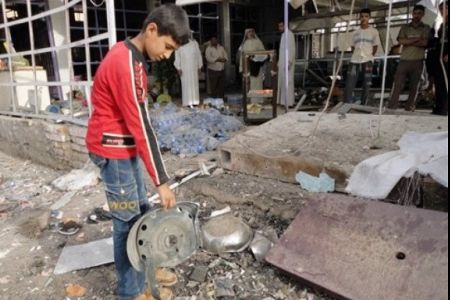Iraq Snapshot: The Normal of Gridlock and Death (Shadid)
 In a week when more than 150 Iraqis died in bombings and other violence, Anthony Shadid writes in The New York Times:
In a week when more than 150 Iraqis died in bombings and other violence, Anthony Shadid writes in The New York Times:
Ten people died at Aroba Square, near a gold-domed shrine in the capital, where a bomber strolled a little after sunset before he blew himself up.
The day after, no one would know that. Electrical wires dangled, billboards were torn, lights were shattered and windows were broken. But that describes anywhere in Baghdad, a city more neglected than destroyed, living on bitter nostalgia.
The scene was ordinary. And that angered Hassan al-Bahadli on Wednesday.
“Seven years!” he shouted, amid a crowd in the dark, claustrophobic warren of Majid Market. “Seven years, and these explosions are still going on?”
An argument ensued, as it often does here. “The first thing in a constitution is the rights of the citizens,” he said. “It’s the respect of the people. There’s no respect here. All we hear are delusions and promises on paper.”
At least you have the freedom to speak, a cousin pointed out. A friend insisted that the dead were really martyrs for a democratic future. These were points heard often after the fall of Saddam Hussein.
They are uttered less now, especially after two days of some of the most vicious bloodletting since 2003 that killed at least 122 people, seven months of political dysfunction that at least hints at a failed state and seven years of occupation, war and misery that have turned disillusionment into disgust.
“What about yesterday?” Mr. Bahadli asked them.
The acting speaker of Parliament said Wednesday that Parliament would meet next week. On Monday, lawmakers who have earned more than $11,000 a month, for 18 minutes of work in a session in June, will gather.
Or maybe not. The biggest bloc is considering whether to boycott, and a quorum is in question. Even if it does meet, there is no deal to end the gridlock.
As the stalemate drags on, people complain more urgently, with the inflection of not being listened to. This year, which could be remembered for a partial American withdrawal and the election of a government meant to preside over the departure of the rest of those troops, may be recalled differently: the time when a new Iraq --- the term still offered by diplomats and a ruling class ever more divorced from those they rule --- looked broken.
“My friends, my neighbors, my relatives?” said Ahmed Abdel-Amir, 22, a laborer, who gathered a severed arm and leg near the bombing and put them in a bag that was sent to the hospital. “Who could accept this happening to us, day after day?” It was the fourth bombing there in 18 months, residents said.
“The government has failed!” shouted Abed Ali, 16.
Fouad Massoum, the acting speaker who called Monday’s Parliament session, said something about the meeting that could have been applied to the entire anxious country.
“What will happen, I don’t know,” he said. “What will happen, let it happen.”
No one quite knew what happened on Tuesday, either. There were the facts, delivered by the government with seeming investigative prowess. Bombs were planted in 12 cars across Baghdad, each detonated by remote control about the same time. Three more roadside mines went off. Another car was booby-trapped. When it was over, 64 people were dead and 360 wounded, most in Shiite neighborhoods.
“The plan was well thought out,” said Maj. Gen. Jihad al-Jabri, a senior official at the Interior Ministry.
The day after, everyone seemed to be blamed. The American military called it “typical A.Q.I. tactics,” using the initials for Al Qaeda in Iraq, a homegrown group also known as Al Qaeda in Mesopotamia.
Prime Minister Nuri Kamal al-Maliki’s opponents blamed him. “The prestige of the state has crumbled,” said one of them, Fattah al-Sheikh.
Mr. Maliki’s supporters blamed other Arab countries eager to derail any hint of progress in the political talks. Some people in the streets blamed Iran, others America or Israel. A lawmaker aligned with the populist cleric Moktada al-Sadr blamed the security forces. At checkpoints, Hakim al-Zamili complained, you find “the soldier busy talking on his cellphone with his friend.”
One policeman blamed himself. “There’s no way I can stand up to any terrorist,” said the officer, Alaa Salomy. “I have four children. Who will help them? The government?” He answered his own question. “I don’t think so.”
Across town, in Abu Chir, residents looking at another ordinary scene echoed Mr. Massoum. They did not know what would happen next.
“We’re in a coma,” said Yusuf Mahmoud, 55, a shopkeeper.
Down the street, someone had scratched out the face of Mr. Maliki from a faded election poster. At the mention of Saddam Hussein, Rafed al-Sanadi offered praise, or at least what constitutes praise here these days. “When he appeared, even the ground shook in fear of him,” he said. All shared an angst, the incendiary kind, at feeling helpless.
“No one knows who is who,” Mr. Mahmoud said. “No one knows when something will happen. Bombing after bombing, killing after killing. It’s a mess.”
“I don’t know why Iraqi lives are considered cheap.”

 Saturday, November 6, 2010 at 7:33
Saturday, November 6, 2010 at 7:33
Reader Comments